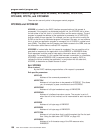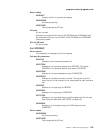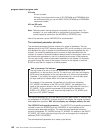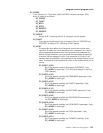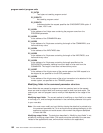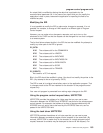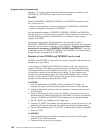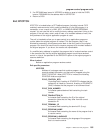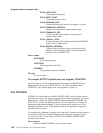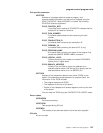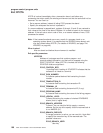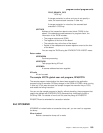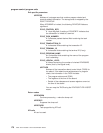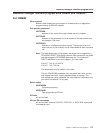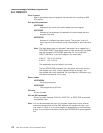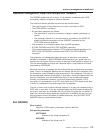PCUE_LOAD_POINT
The program’s load point.
PCUE_ENTRY_POINT
The program’s entry point.
PCUE_PROGRAM_SIZE
Fullword containing the size of the program, in bytes.
PCUE_COMMAREA_ADDRESS
Address of the program’s communication area.
PCUE_COMMAREA_SIZE
Fullword containing the length of the program’s
communication area.
PCUE_LOGICAL_LEVEL
Fullword containing the number of chained DFHRSADS
blocks (that is, logical level).
PCUE_BRANCH_ADDRESS
Fullword. Use this field to supply an alternative entry
address. Set the top bit to specify that the alternative
program is to run AMODE (31).
Return codes
UERCNORM
Continue processing.
UERCPURG
Task purged during XPI call.
UERCMEA
Entry address has been modified.
XPI calls
All can be used.
The sample XPCFTCH global user exit program, DFH$PCEX
Note that there is a CICS-supplied sample exit program, DFH$PCEX, that is
designed to be driven by the XPCFTCH exit. For more information about
DFH$PCEX, see “Sample global user exit programs” on page 14.
Exit XPCHAIR
XPCHAIR is invoked before a HANDLE ABEND LABEL routine is given control.
Note that this occurs only when a program abend causes a branch to an internal
abend routine. (When the HANDLE ABEND request specifies PROGRAM, exit
XPCFTCH is invoked, as described above.) You can use this exit to supply an
alternative handle-abend address. If the exit sets a return code of zero, or an
alternative address of zero, CICS passes control to the application program’s
specified internal routine.
If a modified entry address is supplied, the code that is invoked receives control in
the execution key that the internal abend routine would have received control
in—that is, the key in force when the EXEC CICS HANDLE ABEND LABEL
command was issued.
When invoked
Before a HANDLE ABEND routine is given control.
program control program exits
166
CICS TS for OS/390: CICS Customization Guide



